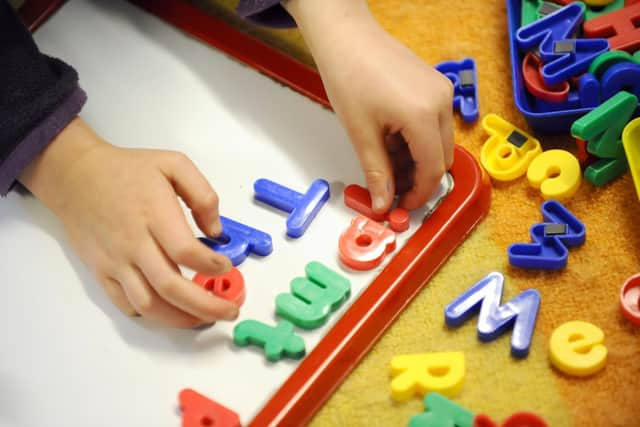Ofsted ‘worried’ by young children’s development in education recovery report
Ofsted Chief Inspector Amanda Spielman has said it is clear that Covid has left some “lingering challenges” in education, and that she is “particularly worried about younger children’s development, which, if left unaddressed, could potentially cause problems for primary schools down the line”.
Today, Ofsted are publishing four briefings examining how students across the age ranges have recovered from the learning and classroom time lost during the pandemic closures.
Advertisement
Hide AdAdvertisement
Hide AdOne of those papers focuses on early years education settings, and has found some providers say children have “limited vocabulary” while “some babies have struggled to respond to basic facial expressions”.


The report, based on inspections of 70 early years’ providers in January and February 2022, found that children have missed out on having conversations or hearing stories, with one provider commenting that young children seem to have spent more time on screens and have started to use accents and voices from programmes they have watched.
A number of providers said that wearing face masks is also continuing to have a negative impact on young children’s language and communication skills.
“Children turning two years old will have been surrounded by adults wearing masks for their whole lives and have therefore been unable to see lip movements or mouth shapes as regularly,” the briefing said.
Advertisement
Hide AdAdvertisement
Hide Ad“Some providers have reported that delays to children’s speech and language development have led to them not socialising with other children as readily as they would have expected previously,” it added.
Anne Longfield, the former Children’s Commissioner, told The Yorkshire Post that “The pandemic has had a devastating effect on children”.
“From missing out on the very foundations of development for very young children to the months of lost learning and huge blow to mental health and confidence of older children.
“It has had an even more pronounced effect in areas of greatest infection – many of which are in the north. Without a long term, large scale recovery programme some children will never catch up.
Advertisement
Hide AdAdvertisement
Hide Ad“Children’s suffering must not be airbrushed from our memories as the pandemic moves on. They must be at the heart of the Covid Inquir/”
James Bowen, director of policy for school leaders’ union NAHT, said: “It is no surprise that the pandemic has had a major impact on some children. We know that repeated lockdowns have meant that most younger children have had reduced social interaction and it is perhaps unsurprising that this has affected their emotional development, social and speech and language skills.
“We’re pleased Ofsted’s report notes that schools are effectively helping children to catch up on these lost skills.
“Schools work incredibly hard to give pupils the extra support they need but they cannot do it alone.
Advertisement
Hide AdAdvertisement
Hide Ad“The Government must also invest in early years services for disadvantaged families, as well as vital services like speech and language therapy.
“So that those children who need specialist support receive it as early as possible.”
A Department for Education spokesperson said: “Our ambitious recovery plan continues to roll out across the country, with nearly £5bn invested in high quality tutoring, world class training for teachers and early years practitioners, additional funding for schools, and extending time in colleges by 40 hours a year.
“We have simplified the National Tutoring Programme to reach as many pupils as possible, with funding going directly to schools from next year. The Nuffield Early Language Intervention Programme is also being used by the majority of schools to improve language skills of reception age children.”
